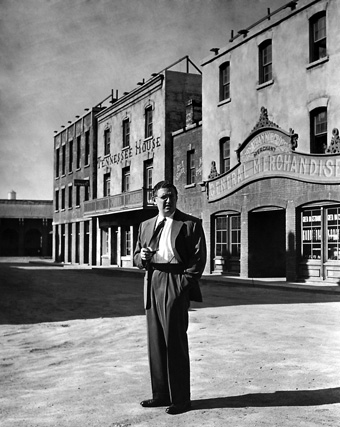There’s a new Cinema Scope out, and in his Editor’s Note, Mark Peranson notes that, “with its economy in shambles and unprecedented cuts to cultural funding, filmmaking is pretty damned close to ending in Portugal. Yet here we are in Issue 53, and Portugal is the unofficial of country of focus; add in the wonder that remains Portugal’s non-Oscar submission, Miguel Gomes‘s cause célèbre Tabu, and against all odds Portugal has given the filmmaking world the most bang for its buck in 2012.”
For example, posted online are Aaron Cutler‘s interview with Joaõ Pedro Rodrigues and Joaõ Rui Guerra da Mata, whose “excellent, Markeresque fiction-documentary hybrid” The Last Time I Saw Macao has won praise at various festivals all year, among them, Vancouver (scroll in a bit), Francisco Ferreira‘s essay on Manoel de Oliveira‘s Gebo and the Shadow, and Andréa Picard‘s piece on Gabriel Abrantes, “known for an increasing number of bold, often mesmerizing, and appropriately divisive works about sexual desire, the effects of historico-socio-political power swings, and globalized psychogeography.”
Also from Issue 53: Boris Nelepo on Jean-Claude Brisseau’s Golden Leopard-winner La fille de nulle part, Michael Sicinski on Amy Heckerling’s Vamps, “an ideal Tuesday night rental,” Chuck Stephens on Bruce Conner’s “1966 dance/film/masterpiece” Breakaway, Adam Nayman on Sarah Polley’s Stories We Tell, Blake Williams on Harmony Korine’s Spring Breakers, Quintín on Ben Affleck’s Argo, and the latest “Global Discoveries on DVD” from Jonathan Rosenbaum, who, at his own site, has recently posted a 1998 lecture, “Is Ozu Slow?“
Adrian Martin and Girish Shambu have begun rolling out LOLA 3, which opens with a “spontaneous LOLA collective” celebration of Leos Carax’s Holy Motors and, in this first round, also includes Erika Balsom on Gregory Markopoulos, Philip Brophy on Crispin Hellion Glover’s It Is Fine! Everything Is Fine., and Yvette Bíró on Elio Petri’s I giorni contati (1962).
Adrian Martin also figures heavily in the latest issue of Screening the Past, which opens with his piece on Raúl Ruiz‘s 2003 essay “The Six Functions of the Shot” and includes his introduction to a collection of the early writings of filmmaker and asylum seeker advocate Vikki Riley, a 1980 review of a collection of essays on Max Ophüls, and Anna Dzenis‘s conversation with him (video, 56’28”) about his new book, Last Day Every Day: Figural Thinking from Auerbach and Kracauer to Agamben and Brenez.
There are, of course, other contributors to Issue 35, which features around two dozen book reviews and pieces on, among other topics, the work of Richard Lester, Terrence Malick, and Jean-Luc Godard.
More reading. “While chainsmoking cigarettes, swallowing amphetamines, writing amateur poetry, and revising scripts and visiting sets and critiquing rehearsals and watching rushes and retaking scenes and checking on rivals’ films, Selznick found time to dictate a blizzard of memos.” David Bordwell sorts through the David O. Selznick Collection at the Harry Ransom Research Center at the University of Texas in Austin.
Dave Kehr posts a link to his New York Times review of Bill Morrison‘s Decasia: “Morrison reminds us, among many other things, that movies are at once glorious illusions situated outside the normal boundaries of time and space and highly fragile physical objects, subjected to a life cycle of their own. The fine new Blu-ray edition of Morrison’s 2002 film from Icarus brings his work into the digital realm, which is of course subject to its own kind of decay, possibly even more devastating in its effects than that which afflicts celluloid. No future Morrisons will be making movies of misaligned 1s and 0s. When a digital file goes, or when the technology to read it slips into obsolescence, it is gone completely and forever. It may well prove that the films of 2012 are more ephemeral than the films of 1912.”
The Los Angeles Times‘ Susan King recommends four books, three “about legendary cinema stars, and a fourth about some of Hollywood’s bit players.”
In other news. “FBI files on Marilyn Monroe that could not be located earlier this year have been found and re-issued, revealing the names of some of the movie star’s communist-leaning acquaintances who drew concern from government officials and her own entourage,” reports Anthony McCartney for the AP.
For the Guardian, Kate Connolly reports that Tyroleans are hoping to find a film Alfred Hitchcock shot in village of Obergurgl in October 1925, his second feature, The Mountain Eagle (1927), which “has been considered lost for the best part of 90 years. Some fear it may have been destroyed because of its highly flammable nitrate base, but many still have faith that the picture, which has been ranked at the top of the British Film Institute’s (BFI) ‘most wanted of the most wanted films,’ is still to be found in a fireproof safe or a film buff’s attic. Hopes were raised earlier this year by the discovery of 24 still photographs in the archive of one of Hitchcock’s closest friends.”
Michael Guillén‘s looking ahead to films from Latin America, Spain, Portugal slated to screen at the Palm Springs International Film Festival, running from January 3 through 14.
Seattle. The Museum of History & Industry’s exhibition Celluloid Seattle: A City at the Movies opens tomorrow and will remain on view through September 8, 2013.
In the works. From @ladygaga: “Terry Richardson @Terry_World is making a #LadyGagaMOVIE documenting my life, the creation of ARTPOP + you!”
For news and tips throughout the day every day, follow @KeyframeDaily on Twitter and/or the RSS feed. Get Keyframe Daily in your inbox by signing in at fandor.com/daily.





